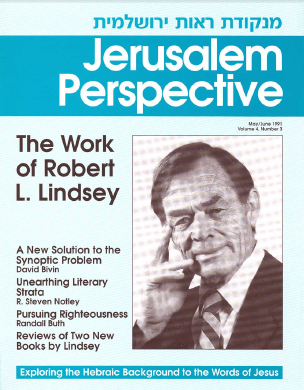מְתֻרְגְּמָן (me⋅tur⋅ge⋅MĀN) is Hebrew for “translator.” The articles in this series illustrate how a knowledge of the Gospels’ Semitic background can provide a deeper understanding of Jesus’ words and influence the translation process. For more articles in this series, click here.
Revised: 25-Oct-2013
A person can’t translate what he doesn’t understand, and sometimes he can’t translate what he understands even if he has words for it in his target language. Discovering the meaning of a passage to be translated can take a Gospel student through some very exotic fields.An interesting problem arose while I was reading and enjoying Robert Lindsey’s book, Jesus, Rabbi and Lord: A Lifetime’s Search for the Meaning of Jesus’ Words.[1] Traditionally, the beatitude found in Matthew 5:10 is read as “blessed are those who are persecuted because of righteousness, for of such is the kingdom of heaven.” Dr. Robert L. Lindsey would read this as “blest are the righteousness-driven,” that is, those with a passion for righteousness. Lindsey cites a possible Hebrew antecedent, נִרְדְּפֵי צְדָקָה (nirdefe tsedakah), to justify the metaphorical and active-voice interpretation of “pursued, persecuted.”[2]
This presents a reader with several problems or riddles. There are a number of unstated intervening steps that an exegete must work through before he is able to evaluate Lindsey’s interpretation as a translation option, or before he can evaluate its historical probability.
Passive or Active?
First of all, the Greek οἱ δεδιωγμένοι (hoi dediogmenoi) could be either reflexive (“those pursuing/persecuting [for themselves]”) or passive (“those pursued/persecuted”), but normally would be read as passive because of the preposition ἕνεκεν (heneken, “because of”) which follows.[3] It therefore would seem that an active-voice translation of the Matthean text is improbable.
Premium Members and Friends of JP must be signed in to view this content.
If you are not a Premium Member or Friend, please consider registering. Prices start at $5/month if paid annually, with other options for monthly and quarterly and more: Sign Up For Premium


Notes
- See my review of Lindsey’s book. ↩
- Lindsey, Jesus, Rabbi and Lord, 123. ↩
- The other New Testament examples of ἕνεκεν (heneken, “because of”) with a noun refer to a reason for an action, never to the desired goal of an action (i.e., not “to pursue after righteousness”): Matt. 5:11; 10:18, 39; 16:25; 19:29; Mark 8:35; 10:7, 29; 13:9; Luke 9:24; 10:29; 21:12; Acts 28:20; Rom. 14:20; (2 Cor. 7:12, purpose clause with infinitive). ↩





